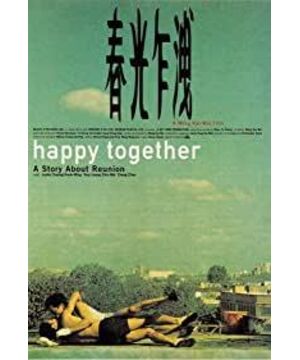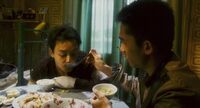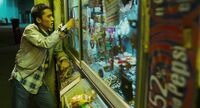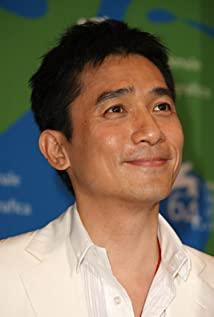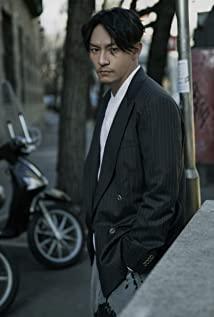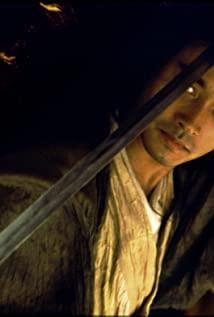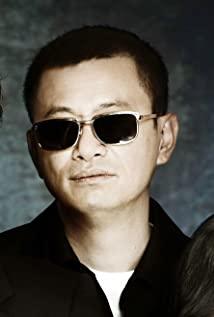Twenty years ago, in the height of summer in Buenos Aires, on the balcony in the afternoon on a hot day, He Baorong hugged Li Yaohui tightly from behind, their bodies intertwined, and their fiery lust evaporated in the air under the scorching sun. , wrapped in a rolling heat wave rushing towards the face. He Baorong looked up at the sky, and Li Yaohui lowered his head to mend the shabby house. This scene of the same-sex mutual sympathy in "Springtime" is still touching.
Today, it is the 20th anniversary of the release of "Happy Spring". The kisses on the rooftop, the partings on the streets, and the sadness under the Evasu Waterfall seem to be vivid in my eyes, and they are about to come out, evoking some heartbroken memories. Here, we might as well climb into the back seat of the car heading for Buenos Aires and follow Wong Kar-wai's lens to return to that directionless, far-flung country, day and night, warm or cold, while revisiting the basic At the same time as the exotic years of burning love, you can feel the aesthetic charm of Wong Kar Wai, which is enough to impress the judges at Cannes.
Awaken the spring light
"Li Yaohui, why don't we start all over again."
This is the first line of "Spring Comes Together", and it is also the love curse that runs through the film. Because of the restart, Li Yaohui and He Baorong came to the other side of the earth to find new start. Because of starting all over again, the struggle at the bottom of the homeland has gained warmth and color. And every time He Baorong said this love curse, Li Yaohui would heal the scar and forget the pain, and let him go back to the past. No matter how willful He Baorong is, the flags are fluttering. As long as he says "start over", someone will wipe his body for him, get out of bed to buy cigarettes in the middle of the night, let out the bed to sleep on the sofa, and even drag his seriously ill body to fry and cook for him, willing to shield him from the wind rain. Because of his fearlessness, He Baorong asked for too much. Because of chasing excitement, He Baorong was drunk and dreamed of death. The ending of love that cannot share joy and sorrow has long been doomed.
However, Li Yaohui refused to believe that this love had a beginning and an end, and his unrelenting efforts became Li Yaohui's only means to keep He Baorong. Deep in his heart, he didn't even want He Baorong's hand injury to heal as soon as possible, because the sense of security generated by relying on it made Li Yaohui think that everything could really be done all over again. He even hid He Baorong's passport just to keep this hard-won long-term companionship. However, this move completely angered He Baorong. He is like the "footless bird" mentioned in "The True Story of Ah Fei". Once he hits the ground, it means death, and he is destined to drift in the wind for a lifetime. Li Yaohui thought he had given him a home, but in fact it was just a refuge for He Baorong to rest and heal his wounds. When He Baorong slammed the door and turned around, Li Yaohui still did not hold back, but this time he would not wait any longer. What I can't keep, I can't keep it after all. Possession and sacrifice can't tame the unruly wanderer. Everything in the past is just my own wishful thinking.
A broken mirror and a reunion will inevitably leave scars, and what is lost and recovered may not last long, and no matter how loyal and passionate emotions are, they will not be able to withstand the ravages of chaos and abandonment. However, up to this time, He Baorong still naively believed that his love spell could surpass worldly reason, and Li Yaohui, who could not quit himself, was still waiting silently.
Finally, He Baorong was tired of playing. He returned to the rented house where the two of them lived, placed the cigarettes Li Yaohui prepared for him, wiped the floor, repaired the revolving lantern, and opened the door from time to time to look forward to Li Yaohui's return. However, Li Yaohui, who was disappointed and saved enough, has come to the end of the journey - Evasu Waterfall. He remembered that the two people standing under the waterfall should be him and He Baorong. The dislocation of time and place, the gap between ideal and reality, announced that this period of sadomasochism has finally ended the endless cycle. He Baorong, who was so remorseful, cried like a tearful man, but he didn't know that Li Yaohui had abandoned the memory of their love at the end of the world. I have never understood the love you want, and you can't bear the love I gave. The love between Li Yaohui and He Baorong did not end, but the final destination of the souls was different. And the reason why "Breakthrough" is still regarded as a classic of literary and artistic romance films, in addition to the affectionate interpretations of Leslie Cheung and Tony Leung, is also closely related to director Wong Kar-wai's unique artistic attainments.
The language of Wong Kar-wai's films that made the spring
was heavily influenced by Hong Kong's New Wave films in 1979, although the movement came to an end in 1982. However, the realist soul and novel and unique film language of the Hong Kong New Wave have deeply influenced a new generation of Hong Kong filmmakers. After Wang Kar-wai entered the film industry from TV in 1981, he still waved the New Wave video banner on the screen. One of the flag-bearers, even after the decline of Hong Kong movies in 1995, Wong Kar-wai's limelight is still unabated. Born in 1997, this "Breakthrough" also has a strong impressionist, perceptual, gorgeous and decadent private image imprint. Even after 20 years, the high degree of fit of the sound and picture elements still requires us to read it repeatedly.
Shots: Wong Kar-wai's films have never emphasized story and drama, so in his films, the use of fixed shots does not focus on explaining the picture information and promoting the narrative. The wandering soul of a foreign country, the noise of the bottom of the society, and the incomprehensible appearance and separation are all expressed by a "shaking". This is also Wong Kar-wai's royal photography - Du Kefeng's hand-held photography style amplifying the externalization of the emotions of the characters. In addition, the innate sense of presence of the hand-held camera has also shortened the emotional distance between the audience and Li He, especially the indoor scenes are almost all hand-held follow-up shooting. The bystanders of the life of the same-sex couple feel the deepest empathy. That's one of the reasons why, 20 years later, we're still mourning this "can't start over" relationship.
In the composition, the composition technique of hand-held shooting + oblique perspective can be seen everywhere, especially in the description of streets, corridors, rooms and other environments, creating a mysterious sense of alienation in "Lost in Buenos Aires". There is even a completely upside-down Hong Kong neighborhood in the film, using the dislocation and deformation of time and space to express Li Yaohui, who is far away from his hometown, to suppress his uneasy emotions and living conditions. In Li He's life description, the appearance of hand-held follow-up shooting + oblique perspective makes their already scarred love crumbling.
In terms of characterization, the irrational perspective of the oblique composition magnifies He Baorong's drunken life, dreaming and dying, and rashness. In contrast, Li Yaohui and Xiao Zhang (Zhang Zhen) in the horizontal composition shot face the reality and are down-to-earth. In terms of slow motion processing, the film uses normal shooting speed to slow down to create a blurry, mottled, or even stuttered, psychedelic color, and the heartbroken memories are rendered blurred and absurd. It can be said that the movement of the mirror in "Spring Comes Together" does not emphasize the narrative effect of succession and transformation in the traditional sense. The strong metaphorical color, strong modeling and emotional expression make the whole film a sad lyric poem, between the lines. Endless sadness.
Dialogue: Since the lenses are all used for concave shapes, the narrative logic of Wong Kar-wai's films basically relies on "one mouth", and the same is true for "Breakthrough". The changes in the environment, the flow of space, and the transformation of the relationship between characters are all completed by monologues, narrations, and dialogues. For example, in the opening part, after the skip-cut shot of the passport stamp, it is a large monologue of Li Yaohui, which describes the current situation of the two of them in love. , the reasons for departure are clearly explained. With a twitch of the lower body, the two had already arrived in Argentina. In this opening paragraph, the narrative purpose of the camera is all realized by the voice-over. This return to literary and emotional subjective narrative simplifies and advances narrative through lyricism. Although the space jump is too strong, there is a stream of consciousness color of "where you think about it", but each frame is full of implication and emotion, which makes the whole film "deformed but not scattered".
When filming dialogues, Wong Kar-Wai did not care about the traditional "front and back" axis law at all. Most of the dialogues were completed in long shots, and the characters and the environment were integrated. The large voice-over greatly extends the off-screen space of the shot, and together with the open composition, it strengthens the emotional tension of the whole film. For example, in the picture above, He Baorong looked at Li Yaohui and said, "Why don't we do it all over again", the camera did not immediately cut to Li Yaohui's facial expression. The silence outside the painting and the expectation inside the painting became an emotion at this time. Tension, the helplessness of wanting to give up, jumped out of the painting, affecting the heart.
Whenever referring to Wong Kar Wai's dialogue style, the term "polyphony" is always one of the most discussed features by scholars. The "polyphony" in Wong Kar-wai's films can be simply summed up as "multi-perspective transformation at any time". In "Breakthrough", Wong Kar-wai did not tell a complete and closed story from the perspective of God. He Baorong, Li Yaohui, and Xiao Zhang are all individuals with independent consciousness. The monologues are intertwined, collide with each other, create sparks, and continue each other. The open and multi-perspective narration brought by the polyphonic dialogue makes the whole film a multi-part "destiny trio". At the same time, it also provides the audience with the possibility to have a dialogue with the characters in the film, as if you and I are He Baorong, Li Yaohui, or Xiao Zhang, hesitating, moving forward and wandering in the vast crowds and urban corners.
Light and Shadow: In "In the Mood for Love", the 24 sets of colorful cheongsam are the external manifestation of Su Lizhen's rich emotions. "Evil in the East and Poison in the West" uses bird cages to create a contrast of light and dark, and uses shades and color blocks to show emotional temperature. It can be said that Wong Kar Wai has always disliked the use of natural light. His light and shadow expression and visual impact come from Du Kefeng's unpredictable photography style and Zhang Shuping's delicate and perceptual art direction. However, in "Breakthrough", the expression of color is more direct and concise - from the first time He Baorong said the sentence "It's better for us to start from scratch" that made Li Yaohui enchanted, the cold black and white became the life of the two of them. The background color of love, the elusive sadness, the depression after parting, and the struggles of life at the bottom are all magnified by black and white images. And it was not until He Baorong said the curse for the second time that the spring light that was about to come out on the screen, the soul and flesh were entangled, and the erotic cohabitation lived in the warm yellow, orange and green tones, hot and lazy. , reaching the highest saturation in the classic rooftop bridge section, which also indicates a sharp turn in the relationship between the two.
In addition to rendering the characters' emotions, Wong Kar-wai's control of colors and artificial light sources also plays a role in shaping the space. In this classic long shot of tango, Li Yaohui and He Ronghua dance at the intersection of the diagonal composition. The top light reflects only the two of them dancing affectionately, forming a strong contrast of light, shade and warmth with the surrounding environment. The kitchen becomes bright and open under Wong Kar Wai's lighting. You and I, who are having fun in hardship, make this fleeting love even more illusory.
It is worth pondering that after He Baorong left Li Yaohui again, the latter's emotional world did not fall into lifeless black and white. The subtle and ambiguous relationship with "new love" Xiao Zhang, regaining the direction and motivation of life, retained the spring in Li Yaohui's life. The alternation of cold and warm tones means that Li Yaohui escaped from the bondage of He Baorong's love curse, and is heading for a life of joys and sorrows, alternating between warm and cold. And He Baorong is still wandering in the dim and lonely afterglow of love, self-exiled and displaced in a foreign country.
Theme: "Rejection and Search" has always been the motif of Wong Kar-wai's films. In 1995, Wong Kar-wai said at the 32nd Taiwan Golden Horse Film Festival: "After five films in a row, I found that what I have been talking about is nothing more than one of them. Rejection, fear of being rejected, and the reaction after being rejected, the reaction between choosing memory and escaping..." As Ouyang Feng said in "Evil and Poison in the West": "I know how to protect myself since I was a child, and I know what I want to do. In order not to be rejected, the best way is to reject others first." In "Happily Ever After", the opposition between seeking and rejecting is not only reflected in the self-contradiction of the individual. Wong Kar Wai portrays Lai Yaohui and He Baorong as emotional symbols of search and rejection, so as to form the opposition between emotional appeal and soul destination.
In the film, Li Yaohui has always been the one who took the initiative to look for. He offered to look for the Evasu Waterfall in order to find the "sexual energy" that reignites the impulse and passion of love. After getting lost in Argentina, He Baorong refused to go with him on the pretext of being too bored, and chose to have fun with foreigners and live in no fixed place. In stark contrast, Li Yaohui is self-sufficient and self-sufficient. And after He Baorong uttered the love curse, Li Yaohui, who knew that it would be difficult to break the mirror, still did not refuse. The opposition between the two of them looking for and rejecting has also not changed. Why is it that Li Yaohui is the one who protects Baorong from the wind and rain.
He Baorong's chaos and abandonment finally fulfilled Li Yaohui's loss. The symbolism of Evasu Falls has also sublimated into a watershed in life. In the end, the only one standing under the waterfall was Li Yaohui, who kept walking and searching. Xiao Zhang, who walked side by side with Li Yaohui, also reached the poem and the distance, and completely buried Li Yaohui's tearful heartbreak memories at the end of the world. The ritualized bridge symbolizes Li Yaohui's bid farewell to the past and bravely moving forward. Through the polyphonic dialogue, we learned that the two of them also embarked on a journey of returning to their hometown to find their roots.
On the other side of the world, He Baorong, who refuses to grow up, refuses to return, and refuses to pay, bears the loneliness of walking alone, fights beasts in the shabby room where the love between the two remains, and lives alone in a different place and a foreign land. With the mirror flowers on the lampshade, I fantasize about the unreachable other side of life and the embrace of my lover, and are forgotten in the corner of the city with the tears of regret...
The English name of "Happy Together" is taken from the song of the same name by the old psychedelic rock band "The Turtles". Judging from the love endings of Li Yaohui and He Baorongtian, "Happy together" is more like a satire full of negativity about homosexuality. It wasn't until Wong Kar-wai personally came forward to refute the rumors that the audience understood the first meaning of "Happy together": "Some viewers may find the title a bit cynical because Lai Yaohui and He Baorong didn't end up together, but for me, Happy together It does not simply refer to the achievement of positive results between two people, but it can also be a person who accepts his own past and present to achieve the integrity of his soul and self. Only in this way can we embrace a better encounter and a future full of infinite possibilities. "Putting it in the story of "Happy Spring", in fact, it still expresses the motif of "rejection and search".
On the other hand, 1997 coincided with the return of Hong Kong, and Wong Kar-Wai also deliberately used the pattern to become the theme, and in "Breakthrough" shows the psychological predicament of Hong Kong people's self-identity before the return of 1997. He chose the ivory tower in Argentina on the other side of the world, in an attempt to get rid of the realistic pressure of the shadows with the polarized geographical gap. But just like Li Yaohui in the film, Wong Kar-wai finally discovered that Hong Kong exists wherever he goes to the ends of the earth. Just like Li Yaohui's epiphany at the Liaoning Street Night Market in Taipei: "I finally understand why he (Xiao Zhang) can be so happy, walking around outside, because at least there is a place to go back."
On the contrary, He Baorong's self-destructive on-screen character is actually an extreme manifestation of another type of Hong Kong people's passive and evasive mentality. Because they are unwilling to face the drastic changes in their homeland, they choose to self-exile, and eventually become a lonely wandering stranger in a foreign country. And Lai Yiu Fai's life change from wandering around the world to getting lost, also conveys that the creator, Wong Kar-wai, has accepted the present and the past of Hong Kong, and is ready for a better encounter and a future full of infinite possibilities. The picture of life under different choices, while bringing out the second meaning of "Happy together", once again completed the deepening of the theme of "rejection and search", and the theme of the film is from love to the humanistic height of home and country. In addition, considering that the homosexual theme will face more criticism after the return, and he always believes that Hong Kong's LGBT movies lack a civilian perspective, this "Happy Birthday" also fulfilled Wong Kar-wai's dream of shooting LGBT-themed movies freely.
Reminiscence
of Spring Compared with Wong Kar-wai's previous works, the story of "Happy Spring" is more linear. In terms of theme setting, the deep loneliness of modern people is in the same line as the sense of wilderness in modern cities, but it does not go further and further on the irrational road of cold and absurdity. Each character also has a relatively clear destiny. However, the simplification of personal style was not the original intention of Wong Kar-Wai's filming of "Splendid Spring". Thanks to Wong Kar-wai's spontaneity of "shooting wherever he thought of", "Splendid Spring" almost became a group portrait again, fragmented. , a nihilistic love story.
As we all know, Wong Kar-wai's freehand images make the script dispensable, but he was a screenwriter, but he used to give some dialogues to the actors on the day of filming. Brain tonic. Accustomed to the step-by-step process of the film industry system, Wong Kar-wai's willful scheduling method is indeed difficult for actors to accept. Kimura Takuya said at the 70th Cannes Film Festival recently that he would not cooperate with Wong Kar Wai without Tony Leung, because he did not know what Wong Kar Wai was filming. Back in 2004 in "2046", Maggie Cheung had to sneak into the venue to see how many of her scenes had been deleted, but the result was only 30 seconds of scenes. Tony Leung wants to "guess" that his character may be the only human being. As for the cast of Gong Li, Zhang Ziyi, Carina Lau, Zhang Zhen, Dong Jie, etc., no one can really tell what they are playing in "2046". Such a situation also happened in the behind-the-scenes shooting of "Happy Together".
In the early days of the filming of "Happy Birthday", the whole crew traveled thousands of miles to Argentina, which is the farthest from Hong Kong, to start work. In the mind of the backbone, Wong Kar-wai, except "Well, Leslie Cheung and Tony Leung are starring, and they want to live together" Nothing. Even Li Yaohui and He Baorong were named after the two camera assistants of the crew. Thanks to Wong Kar-wai's procrastination, the original six-week shooting took four months to complete. The torment of homesickness tormented every actor, but instead forced the actor's performance to be explosive and infectious. During these four months of shooting, the material was overturned several times, the characters were repositioned, and the arrangement and combination of different characters and emotions were intertwined into a more trance and blurred "Affair in Buenos Aires", which is also Wong Kar Wai. Positioning of the original story of "Happy Together".
In the waste film of "Breakthrough", Tony Leung played the role of He Baorong. He and Li Yaohui (Leslie Cheung) did not form the opposition between rationality and madness, seeking and rejecting. On the contrary, both of them have a tendency to self-destruct and dream of life. He Baorong has a morbid possessiveness and committed suicide for Li Yaohui twice. He hid Li Yaohui's passport and wanted to impose He Baorong's real name on Li Yaohui (Leslie Cheung), just to completely occupy the other's body and memory. The story begins in a Chinese restaurant, and there is a female doctor who silently loves He Baorong. The story ends with He Baorong (Leung Chiu Wai) committing suicide, and Li Yaohui's life and death is uncertain. However, after the filming of Wong Kar-wai, he realizes that he does not like this ending...
In the later scrap film, Li Yaohui came to Argentina to take care of his father's aftermath, but met his father's same-sex lover. He Baorong. Xiao Zhang broke into their lives. The backpacker played by Shuyi Guan was at a distance between Xiao Zhang and Li Yaohui. After Li Yaohui came to the waterfall, his life and death were unknown. ” is the visual sense. Until the film was almost splurged, Wong Kar-wai suddenly felt that his films had become too guesswork. The broken and intertwined plots, the illusory time and space, the visual impact and emotional color of the sensory symbols were almost standard, and it was better to simplify and converge Let's talk about personal style, let's talk about two men rolling in sheets. Seeing that the director is so tossing about art, the actors whose scenes have been deleted have nothing to say. And if "Spring Comes Together" is really shown on the screen in its original appearance, it will be a lingering, chaotic Wang's classic, but it is no longer a screen legend only belonging to Tony Leung and Leslie Cheung, "We start all over again. Come again" lines will not be embarrassed by many fans of my brother until now.
In a different kind of Spring
, Wong Kar-wai once said in the documentary "Rebirth of Spring at Zero Celsius" behind the scenes of "Happy Spring": ""Happy Spring" is like a full stop, like the end of a certain stage in life, this film is like a A watershed. "As it is, "Breakthrough" not only symbolizes a watershed in the life of the characters in the play, but also a watershed in Wong Kar-wai's artistic career. "Los Angeles News" and "New York Times" praised the novel and unique film language and visual experiments of "Happy Birthday": "Compared with Wong Kar-wai's previous works, the story of "Happy Birthday" is more coherent and humane, but The director's distinctive and bold aesthetic style has not been lost. With this film, Wong Kar-wai won the Best Director Award at the 50th Cannes Film Festival in 1997, and became the first person to receive this honor from the local film market to the world film industry. The Hong Kong director is still the most recognized and well-known Chinese director at the Cannes Film Festival, and even reached the top of the top 100 famous directors of the 21st century after 20 years. Wong Kar-wai himself is light-hearted: "Reputation is not that much to me. Important, "Best Director at Cannes" is just an ad Slogan. "(Ma Yun, who is not interested in money, and Wang Jianlin, who earns him 100 million, expressed dissatisfaction.)
However, Wong Kar-wai's extreme author-like art style has undoubtedly set a high threshold for viewing movies. Although people can't talk about being black all their lives, it's basically impossible to become a fan. In addition, Wong Kar-wai doesn't care about the rules and regulations left by the master at all, such as "script script, the foundation of a play", "the theme first is the taboo of creation" I don't even think about it. Especially in the eyes of American film critics who flaunt a classic narrative. "Happy Birthday" is a typical representative of the deviant. The well-known film critic Rosenbaum is very unaccustomed to the vague story of "Happy Birthday" The main line is quite dissatisfied with Wong Kar-wai's shooting method of "Walking in the Clouds". The main black points of other film critics and film editors also focus on "the lack of storytelling is very dull", "the photography is too casual, the editing is illogical", etc. Etc. In addition, the freshness of Rotten Tomatoes is only 78%...
Whether "Wong Kar Wai's Dafa" is good or bad, different audiences have different answers. Obviously, Wong Kar-wai does not imitate the program routine of the genre film "retaining the audience for 15 minutes", nor does it provide a roller coaster-like viewing experience with twists and turns. This is also the reason why Wong Kar-wai's films are unique - you can't use one genre to define his film style, from "Mong Kok Carmen" to "Evil in the West" to "Chongqing Forest", you can see gangster films separately, The genre characteristics of martial arts films, police and gangster films, nothing more. The same is true for "Breakthrough" - there are no happy enemies, no dramatic plots, and no happy ending with a beginning and an end. Wong Kar-wai is also disintegrating while borrowing elements of the genre of romance films, changing the "three axes" of romance films. The popular and stable narrative structure and polyphonic dialogue of traditional genre films have become the only way for Wong Kar-wai to establish communication and dialogue with the audience. The story full of symbols and metaphors, the distorted time and space, the short-lived love, the lonely ups and downs of the soul, the emotions intertwined with love and hate complement each other on the screen, creating a song that is purely sensory, purely personal, purely The decadent beauty of symbols.
"On the land of zero degrees Celsius, there is no direction, no difference between day and night, no matter whether it is cold or warm, I gradually understand the taste of liberation." - Wong Kar-wai, "Reappearance of Spring
at Zero Celsius"
In August 1996, Wong Kar-wai was at home on the other side of the earth Strolling and lingering, he was He Baorong who was out of the world at that time, and he just wanted to roam the world and escape as far as possible. In the end, he found that no matter how he wandered, he still couldn't escape the gravitational pull of his homeland. At this time, he split into Li Yaohui, who had lost his way and returned, and made a new comeback at the Evasu Waterfall, which symbolized the watershed, ending the self-exile of the vicissitudes of life. At the same time, he also left the back of his departure to He Baorong, who refused to return. The lighthouse at the end of the world buried the heartbeat and heartbreak of the two at both ends of the earth.
After Leslie Cheung's death, a female fan asked Liang Chaowei with tears in the crowd: "Li Yaohui! Do you remember He Baorong?" Liang Chaowei stopped, nodded at her, and turned to leave. Now, 20 years have passed since the spring break in 1997, and we still can't forget the entanglement of spirits and flesh on the rooftop during that hot afternoon. He Baorong and Li Yaohui's unrequited love on the screen was also fixed in that distant country by the mummy complex.
View more about Happy Together reviews


